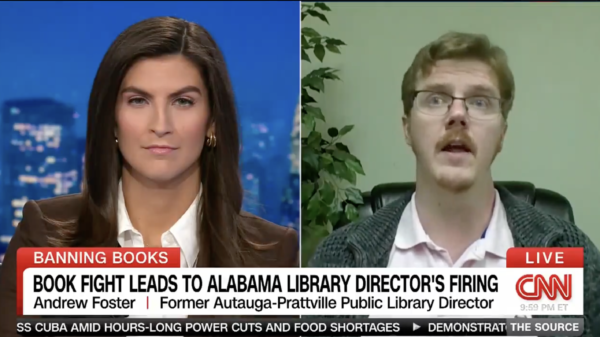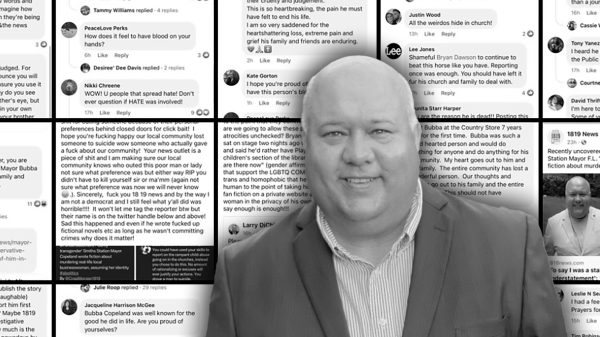By Josh Moon
Alabama Political Reporter
An interview with family members after an unexpected death is probably the toughest assignment in all of journalism.
No one wants to be part of that interview – on either side. There are no good questions and no relief that you can provide to anyone grieving. This is particularly true when the interview subjects are the parents of a dead child.
With that in mind, the trip last January to interview Tim and Chris Lewis, the parents of Andrew Lewis, was not something that I particularly looked forward to doing. I wanted to know the story – to get some understanding of what led to Andrew Lewis’ death and why it was still, a week later, being deemed a “death investigation,” instead of a murder, by MPD – but I wasn’t thrilled about having to ask a bunch of questions to grieving parents and ask them to relive it all again.
One thing that made it a bit easier on all of us — reporter Andrew Yawn accompanied me for the interview – was that the Lewis family was unhappy with the handling of the case by MPD. They wanted answers that they weren’t receiving and they viewed talking to the media as a means to get the story out and possibly spark enough public pressure to get some movement.
So, they wanted to tell this story and answer what they could. During an hour-long interview with Tim, Chris and Andrew’s sister, Laura, they held nothing back, took us step by step through that awful Sunday. What they told us was both incredibly sad and incredibly infuriating.
That Sunday morning at around 6 a.m., Andrew Lewis had been shot. Tim Lewis was away at a church retreat. Laura and Chris spent the morning and early afternoon doing normal Sunday things.
At around 2 p.m., nearly eight hours after Andrew Lewis was killed and MPD officers arrived on the scene, a pair of detectives knocked on the front door of the Lewis home.
Eight hours is a remarkable amount of time for one reason: MPD detectives and high-ranking officers knew the identity of the victim at the shooting scene almost immediately. Not only that, they knew how to contact the Lewis family and could have easily done so within minutes.
This is not speculation on my part.
When police arrived at the scene of Andrew Lewis’ shooting, they found at least one other person – the man who has admitted to shooting and killing Andrew Lewis, Eli Miller. Sources familiar with the investigation within MPD also said Lewis’ former girlfriend Mary Jehle was at the scene for a period of time, but it wasn’t immediately clear if she left after police arrived or left before their arrival and then returned later.
Regardless, the people at the scene could identify Lewis.
In addition, high-ranking officers within MPD were made aware of the circumstances from the start. Two sources with knowledge of the investigation said Mayor Todd Strange alerted police chief Earnest Finley to the “sensitive nature” of the shooting before 8 a.m.
Sources familiar with the investigation said Strange was notified of the situation by an attorney working for Jehle’s father, who is an executive at Dixie Electric. Strange then informed Finley that the case “involved some very important people” and that it should be handled “by the book.”
Playing it by the book apparently meant initiating an investigation and working it for several hours, forming a theory and then talking to the family of the shooting victim. All while conversing with both the shooter and a witness for most of that time, but we’ll get to that later.
When detectives entered the Lewis home that Sunday, they didn’t tell Chris and Laura that Andrew was dead. Instead, they started asking questions about the relationship Andrew had with his ex-girlfriend, Mary Jehle. They wanted to know of past problems, of which there were many. They wanted details about some of those problems, what happened from their perspective.
To be sure, as the Lewises would tell us during the interview, the on-and-off relationship between Andrew and Mary Jehle had its share – and then some – of drama. There were numerous instances in which police were called and a couple of arrests for Andrew, although no acts of violence or even threats of violence between Andrew and Jehle. There was also a nasty incident between Andrew and some of Jehle’s friends, in which Andrew ended up being hogtied. And plenty of other public spats.
Yes, Laura and Chris told the detectives, there’s a sordid history there. And so, what is it this time? What was the fight about now? Was Andrew being arrested?
At that point, after 30 minutes of questions, the detectives told Laura and Chris that Andrew was dead. The victim of a shooting.
But that’s all they would say. They wouldn’t tell them who pulled the trigger, despite the fact that the shooter had apparently all but confessed to the shooting. (Miller’s attorney wouldn’t say what Miller told police at the scene, if anything, but did say Miller made it clear that he was acting in self-defense.)
Strangely, one of the detectives asked Laura and Chris to guess who shot Andrew, and caught up in a state of shock and bewilderment while trying to make some sense of what was happening or what had happened, they began tossing out names. Each time, the detective would shake his head or say he couldn’t tell them. Chris described the odd scene as a morbid gameshow.
“It was not handled very professionally,” Laura said.
During the interview, the Lewises expressed anger and frustration with MPD’s handling of the case. Much of that was based on the fact that it was still, 10 days later, labeled a “death investigation” and not a homicide. But those feelings also stemmed from the lack of information provided to them from police.
The Lewises had learned very little about the incident. In fact, Yawn shared some details with them during the interview that police had failed to disclose.
In another odd twist, Chris Lewis said at the initial interview that Sunday, one of the detectives told her information about what led to the shooting – that Andrew had rammed Mary Jehle’s car with his car. When she called back 10 days later to ask about that, to try to get a better understanding of what happened, she said the detective denied telling her that piece of information. So, she asked Laura to be sure that she heard him correctly, and Laura confirmed she had.
Add that to the lack of communication – an issue that MPD and city officials would later admit to – and it was too much for the Lewis family to take without objection. A family friend who serves as a district attorney in another county in Alabama was so angered by what Tim Lewis told him about the case that he made personal inquiries bordering on threats in an effort to get some information for the Lewis family.
It did little good.
Instead, the Lewis family was left with only bits of information that they could squeeze out of detectives during phone calls and brief visits. And much of that, they believed, was provided only because the detectives needed information from them.
But even with the limited info, slowly, a picture began to take shape.























































